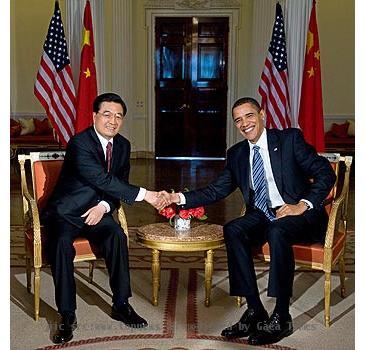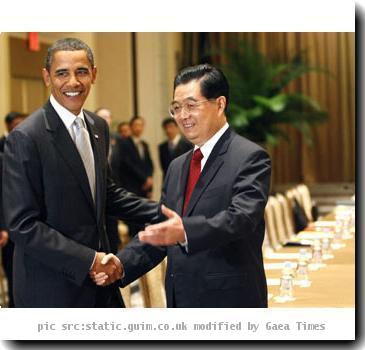Chinese yuan revaluation talk supports stock markets; Spanish bank takeover pressures euro
By Pan Pylas, APMonday, May 24, 2010
Chinese yuan revaluation talk shores up markets
LONDON — World stocks mostly rose Monday after a turbulent few days amid expectations that China will loosen its currency policy, which would improve the outlook for global trade, though the effective nationalization of a regional bank in Spain pressured the euro once again.
In Europe, the FTSE 100 index of leading British was up 9.01 points, or 0.2 percent, at 5,071.94 while France’s CAC-40 rose 20.52 points, or 0.6 percent. Germany’s DAX was 25.42 points, or 0.4 percent, lower at 5,803.83.
Earlier in Asia, China’s Shanghai Composite index jumped 3.5 percent to 2,673.42 as jitters of tighter credit policies eased amid mounting hopes for the yuan to appreciate. Most other stock markets in the region were buoyed by Beijing’s apparent willingness to talk about currency reform.
China’s president Hu Jintao said at the opening of talks with a U.S. delegation headed by Treasury Secretary Timothy Geithner that the country “will continue to steadily advance reform of the yuan exchange rate.”
In response Geithner welcomed the fact that China’s leaders have “recognized that reform of the exchange rate is an important part of their broader reform agenda.”
Most analysts think it’s crucial that the yuan is allowed to rise against the dollar if the world economy is to grow in a more balanced manner in the months and years ahead.
For many years the Chinese authorities have kept their currency artificially low against the dollar, partly as a means of boosting their exports to the United States. As a result, China has built up a massive trade surplus with the U.S.
“Positive signals coming out of Geithner’s meeting in Beijing will add to risk appetite as it reduces the risk of a trade war,” said Hans Redeker, global head of foreign exchange strategy at BNP Paribas.
Risk appetite has also been buoyed by the refusal by most EU countries to follow Germany’s shock decision last week to ban naked short-selling, a type of speculative trade.
Though the ban caused consternation and contributed to heavy losses in stock markets as well as the euro currency, there does not seem to be much of an appetite elsewhere in the world to introduce similar measures.
Nevertheless, Europe’s debt crisis, which has already seen Greece bailed out and raised questions about the future of the euro currency, is never too far from investors’ minds.
Wall Street, which ended last week strongly, is set to open lower later — Dow futures were down 37 points, or 0.4 percent, at 10,123 while the broader Standard & Poor’s futures fell 5.7 points, or 0.5 percent, to 1,078.90.
The euro was undermined by the weekend news that the Bank of Spain was taking over regional bank CajaSur after merger talks with another similar entity broke down.
“If any reminder were needed of the problems facing the eurozone then it was provided by Spain at the weekend when the Bank of Spain stepped into rescue one of its biggest regional banks as a good portion of its property loan book went bad,” said Michael Hewson, an analyst at CMC Markets.
By late-morning London time, the euro was down 1.1 percent at $1.2414 — despite the fall, Europe’s single currency is still way up from the four-year low of $1.2146 recorded Wednesday in the wake of the German ban of naked short-selling.
Elsewhere in Asia, Australia’s S&P/ASX 200 added 2.1 percent to 4,395.40 while Hong Kong’s Hang Seng gained 0.6 percent to 19,663.66. Stock markets in South Korea, India, Singapore and Indonesia all gained.
However, Japan’s Nikkei 225 stock average dropped 26.14 points, or 0.3 percent, to 9,758.40 while Thailand’s benchmark index fell 2.3 percent with investors cautious after the worst political violence in the Thai capital in decades last week.
Oil prices continued to hover around the $70 a barrel mark — benchmark crude for July delivery was up 25 cents to $70.29 a barrel in electronic trading on the New York Mercantile Exchange.
____
Associated Press Writer Alex Kennedy in Singapore contributed to this report.
Tags: Asia, Beijing, China, East Asia, England, Europe, Germany, Greater China, Hu Jintao, London, North America, Southeast Asia, Spain, United Kingdom, United States, Western Europe, World-markets


